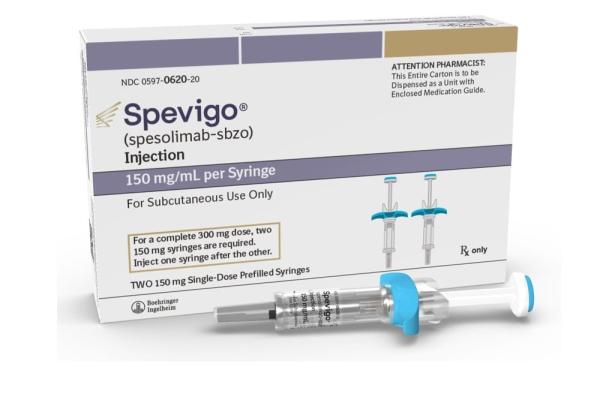Spesolimab Side Effects
Medically reviewed by Drugs.com. Last updated on Aug 6, 2025.
Applies to spesolimab: intravenous solution.
Precautions
It is very important that your doctor check your or your child's progress at regular visits to make sure that this medicine is working properly. Blood tests may be needed to check for unwanted effects.
Check with your doctor right away if you have a fever, chills, cough, flu-like symptoms, or unusual tiredness or weakness. These may be signs that you have an infection.
This medicine may cause serious allergic reaction, including anaphylaxis, which can be life-threatening and requires immediate medical attention. Check with your doctor right away if you have chest tightness, cough, difficulty swallowing, dizziness, fast heartbeat, hives, itching, or skin rash, puffiness or swelling of the eyelids or around the eyes, face, lips, or tongue, trouble breathing, or unusual tiredness or weakness.
This medicine may cause infusion-related reactions, which can be life-threatening and require immediate medical attention. Tell your doctor right away if you start to have a fever, chills or shaking, dizziness, trouble breathing, itching or rash, lightheadedness or fainting after receiving this medicine.
Serious skin reaction, including drug reaction with eosinophilia and systemic symptoms (DRESS) can occur with this medicine. Check with your doctor right away if you have black, tarry stools, chest pain, chills, cough, fever, painful or difficult urination, sore throat, sores, ulcers, or white spots on the lips or in the mouth, swollen glands, unusual bleeding or bruising, or unusual tiredness or weakness.
While you are being treated with spesolimab-sbzo, do not have any immunizations (vaccines) without your doctor's approval. Live virus vaccines should not be given with spesolimab-sbzo.
Serious side effects of spesolimab
Along with its needed effects, spesolimab may cause some unwanted effects. Although not all of these side effects may occur, if they do occur they may need medical attention.
Check with your doctor or nurse immediately if any of the following side effects occur while taking spesolimab:
More common side effects
- bladder pain
- bloody or cloudy urine
- difficult, burning, or painful urination
- frequent urge to urinate
- large, flat, blue, or purplish patches in the skin
- lower back or side pain
Less common side effects
- blistering, crusting, irritation, itching, or reddening of the skin
- bruising at the injection site
- body aches or pain
- chest pain
- chills
- cough
- coughing or spitting up blood
- ear congestion
- fever
- headache
- itching of the vagina or genitals
- loss of voice
- muscle aches
- night sweats
- sneezing
- sore throat
- stuffy or runny nose
- sudden high fever or low-grade fever for months
- swelling
- thick, white vaginal discharge with mild or no odor
- trouble breathing
- unusual tiredness or weakness
Incidence not known
- black, tarry stools
- bleeding, blistering, burning, coldness, discoloration of skin, feeling of pressure, hives, infection, inflammation, itching, lumps, numbness, pain, rash, redness, scarring, soreness, stinging, swelling, tenderness, tingling, ulceration, or warmth at the injection site
- inability to move the arms and legs
- painful or difficult urination
- sores, ulcers, or white spots on the lips or in the mouth
- sudden numbness and weakness in the arms and legs
- swollen glands
- unusual bleeding or bruising
Other side effects of spesolimab
Some side effects of spesolimab may occur that usually do not need medical attention. These side effects may go away during treatment as your body adjusts to the medicine. Also, your health care professional may be able to tell you about ways to prevent or reduce some of these side effects.
Check with your health care professional if any of the following side effects continue or are bothersome or if you have any questions about them:
More common side effects
Less common side effects
- hives, itching, or skin rash
- swelling of the eye
See also:
For healthcare professionals
Applies to spesolimab: intravenous solution, subcutaneous solution.
General adverse events
The most common adverse effects were infections. Infection occurred in 14% of patients during the first week of treatment as compared to 6% in the placebo group. The majority of infections reported were mild (29%) to moderate (71%).[Ref]
Gastrointestinal
- Very common (10% or more): Diarrhea (11%)
- Common (1% to 10%): Gastritis, nausea and vomiting, oral herpes[Ref]
Dermatologic
- Common (1% to 10%): Cellulitis, furuncle, herpes dermatitis, pruritus and prurigo, subcutaneous abscess, urticaria[Ref]
Two patients experienced drug reaction with eosinophilia and systemic symptoms (DRESS). The validation scoring for reported cases were "no DRESS" and "possible DRESS".[Ref]
Genitourinary
- Common (1% to 10%): Bacteriuria, urinary tract infection, vulvovaginal candidiasis, vulvovaginal mycotic infection[Ref]
Local
- Common (1% to 10%): Infusion site hematoma and bruising
Not reported: Injection site reactions[Ref]
During clinical trials, injection site reactions (including injection site erythema, injection site swelling, injection site pain, injection site induration, and injection site warmth) were observed.[Ref]
Nervous system
- Common (1% to 10%): Headache
- Uncommon (0.1% to 1%): Guillain-Barre syndrome[Ref]
Ocular
- Common (1% to 10%): Eye edema[Ref]
Other
- Common (1% to 10%): Asthenia and fatigue, bacteremia, device-related infection, otitis externa[Ref]
Respiratory
- Common (1% to 10%): Dyspnea, influenza, latent tuberculosis, upper respiratory tract infection[Ref]
References
1. (2022) "Product Information. Spevigo (spesolimab)." Boehringer Ingelheim, 1
More about spesolimab
- Check interactions
- Compare alternatives
- Dosage information
- During pregnancy
- Drug class: interleukin inhibitors
- Breastfeeding
- En español
Patient resources
Other brands
Professional resources
Other brands
Related treatment guides
Further information
Spesolimab side effects can vary depending on the individual. Always consult your healthcare provider to ensure the information displayed on this page applies to your personal circumstances.
Note: Medication side effects may be underreported. If you are experiencing side effects that are not listed, submit a report to the FDA by following this guide.

